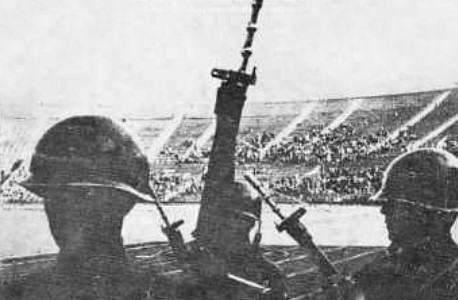By Roger Silverman
[Editorial note: Fifty years ago this month, on September 11, 1973, a military coup took place in Chile, putting a committee (‘junta’) of generals in power, led by General Pinochet. The coup resulted in the bombing of the presidential palace and the subsequent murder of the president, Salvador Allende. Allende’s government had been a left “Popular Unity” government, committed to reforms in the interests of workers and the overthrow was instigated by the Chilean and international capitalist class.
This article by Roger Silverman, was published in the Militant International Review in January 1974. It gives a powerful description not only of the events that led up to the coup itself, but also points to the lessons that socialists need to learn from it.]
……………………………………………………………………………………………..
The role of the army
If this had been a “real people’s revolution”, the first task would have been to “do away with all the old repressive machinery”, disarm the officers by appealing to the troops to set up revolutionary committees, set up Workers; Councils and ensure the right of recall over all officials. Allende, on the contrary, actually began by raising the salaries of the privileged officers, in the vain hope of buying their loyalty, and ended by inviting them into his government! The result was that all the workers’ gains have been lost again, with a vengeance.
Lenin wrote: “In every profound revolution, the prolonged, stubborn and desperate resistance of the exploiters…is the rule. Never – except in the sentimental fantasies of the sentimental fool, Kautsky – will the exploiters submit to the decision of the exploited majority without trying to make use of their advantages in a last desperate battle.” How would Lenin have described Luis Corvalan?
It is bitterly ironic to read Corvalan’s impassioned defence, in one speech or article after another, of the armed forces’ “spirit of professionalism, their respect for the Constitution and the Law” (World Marxist Review, Dec 1970) – and even their “loyalty to the elected government” (World Marxist Review, Nov 1972). For Luis Corvalan, today, is languishing in the military dictatorship’s prisons, awaiting execution by firing-squad. He is finding that the Generals show no gratitude for his compliments over the past three years.
In December 1970, Corvalan described the masses’ enthusiasm at Allende’s election, and concluded: “This atmosphere of approval and solidarity, plus the legitimacy of the election victory which no-one can challenge, and the powerful impact of world socialism, explain why US imperialism and Latin American reaction will find themselves compelled to accept the situation in Chile”. In reality, the ruling class have no scruples about the people’s wishes or the legitimacy of election results when their power is at stake. It was Corvalan, above all, who advanced the most ingenious arguments in defence of the armed forces.
Denying that they were “loyal servants of the imperialists and the upper classes”, he wrote: “Our ground troops and navy were constituted in the fight for independence. Privates and NCOs in all the three arms come from a poor social background, and nearly all the officers from the middle strata. The oligarchy and the prosperous bourgeois have long stopped choosing a military career for their sons…These days, no social institution is indifferent to the social storms raging all over the world and the tragedy of the hundreds of millions of poverty-stricken people. The attitude of the armed forces of the Dominican Republic and the progressive nature of the military government in Peru show that a dogmatic approach to the army is no longer valid…The military establishment, too, needs change – but that change should not be imposed upon it.”
Arguments in defence of officer class
The whole barrage of arguments in defence of the officer caste has been very persuasively refuted by Corvalan’s own jailers. But even without them, it would be obvious that no army in history has not been composed mainly of soldiers from a “poor social background”. We talk of a “capitalist army” not because we expect to find sons of the “prosperous bourgeoisie” in its ranks, or even among most of the officers, but because it is forcibly controlled by a privileged caste, imbued with reactionary prejudices, owing allegiance to the ruling class, trained in such military academies as the Christian Democrats were so anxious to protect. The fact that the Chilean Army fought Spanish colonists, that a group of radical officers in the Dominican Army could revolt against despotism only to be savagely crushed by their own fellow-officers, or that the Peruvian military clique combines demagogic anti-American measures with the torture of trade unionists – these certainly are no insurance that the armed forces are on the side of the socialist revolution.
Certainly, the world’s “social storms” affect the army like any other group of people – but no real Communist can lump the Generals with the privates into a monolithic mass. Did Corvalan expect the hearts of monsters like Generals Leigh and Pinochet, butchers of Chile, to melt at the “tragedy of the hundreds of millions of poverty-stricken people”? What is dogmatic about a class approach to the army? And how is “change” going to come to the armed forces without “imposing” it on the Generals?
The rank and file of the Chilean armed forces, who come from a “poor social background”, could easily have been won if any organised appeal had been directed at them. They could not be expected to risk execution for mutiny without such an appeal. A bloodless revolution could have been achieved if the workers’ parties had campaigned among the troops for revolutionary committees to be set up.
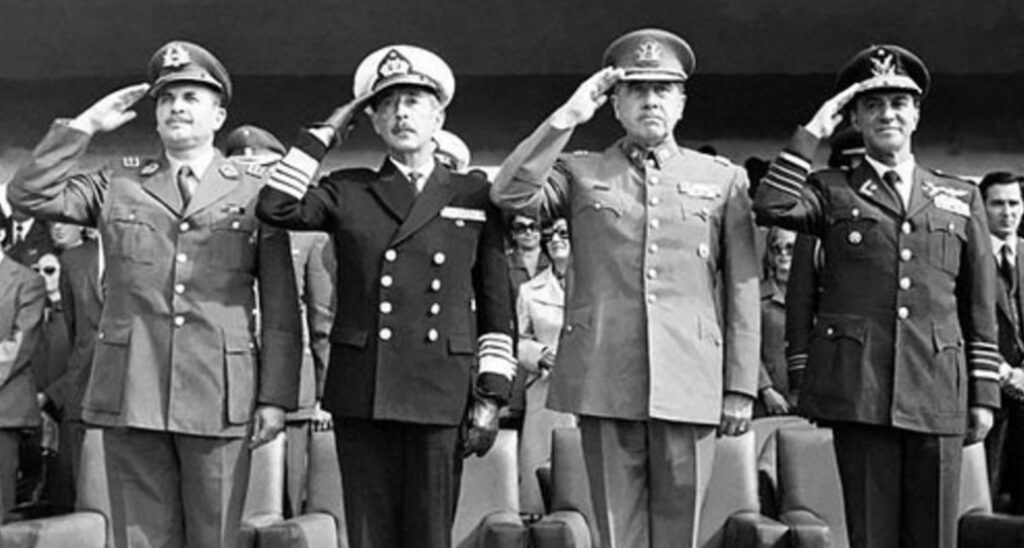
Shortly before the coup, sailors on two battleships off Valparaiso were found reading Socialist Propaganda. So terrified were the Admirals, that hundreds of sailors were arrested and many were tortured to death in the ships’ holds – and this while the “Popular Unity” were still in office! It was a betrayal of these soldiers that no action was taken against the officers.
‘Communist’ leaders played down threats from Army
Were the Chilean workers’ leaders really so childlike as to trust the Generals? Or were they trying to “embarrass” them into passivity? Corvalan wrote in the Morning Star (29/12/70): “To hold that armed confrontation is certain implies the immediate formation of a people’s militia. In the present situation, that would be equivalent to a mark of defiance of the army…it must be won to the cause of progress in Chile and not pushed on to the other side of the barricades.”
Allende, too – as late as June 1973! – “issued a warning against classifying the armed forces as reactionary and thus preventing them from being a dynamic force in Chile’s development.” Two months later, the armed forces began to play a very “dynamic” role, starting with Allende’s murder. What blindness it was, to expect the Generals to respond to such flattery, or that they would be restrained from action by the fact that the workers were not mobilised! They needed no “pushing” to get on to the other side of the barricades. Their job was to act as the ruling class’s armed watchdog. How was power to be taken from the ruling class without “provoking reaction”?
It was this kind of logic that lay behind the cry: don’t give the officers any excuses! The British “left” Labour journal, Tribune, expressed it like this: “Allende desires and in fact has no alternative to working strictly within the Constitution. Most observers here say that while he does that, he can count on the loyalty of the Army. That is why the demand of the Leftist groups for more sweeping measures outside the Constitution is a danger, because the Right hopes for provocations” (20/10/72). Eric Heffer MP wrote a few weeks later that “most of the senior officers are socialist-inclined”!
Attempting to avoid ‘provoking’ the generals
Allende criticised the “irresponsibility” and “anarchy” of the workers and peasants who “went too far”. The Socialist Minister of the Interior, Espinoza, warned: “The government will strictly apply the law in regard to the maintenance of order against those who seek to promote disorder by occupying factories, villages, building sites or land.” His successor, Briones – also a Socialist – announced that “enterprises occupied without reason and not intended for State ownership, will be restored to their owners.”
All this was done to avoid “provoking” the Generals. But who needs “excuses” if he has tanks and planes? Were General Kornilov in Russia, or Admiral Kapp in Germany, prevented from establishing military dictatorships because the workers of Petrograd and Berlin mobilised to repulse them – or because they couldn’t think of any “excuses”?
However, Allende made more and more humiliating concessions with every blow from the Right. When the naval officers bungled an attempted coup on June 29th 1973, through their haste and failure to co-ordinate with the other services, the workers’ leaders were only frightened into grovelling even more profusely before the Generals. Nobody could have asked for such a rare and unmistakeable warning, such a golden opportunity to mobilise, such a precious breathing-space in which to prepare resistance to the menace looming ahead. But instead, appeasement went still further.
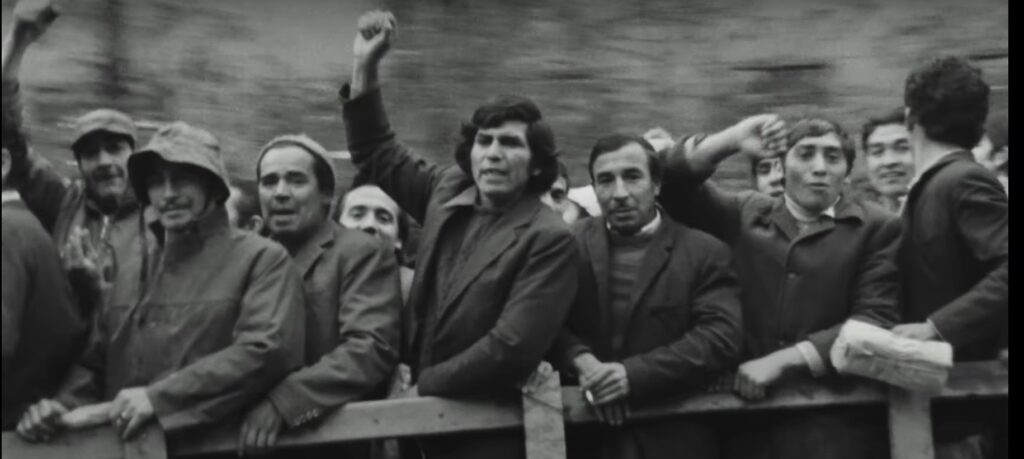
Corvalan (in a speech reprinted in the September 1973 issue of Marxism Today) praised the “prompt and determined action by the Commander-in-Chief, the loyalty of the armed forces and the police”, and replied to allegations that the CP were in favour of organising a workers’ militia: “No, sirs! We continue to support the absolutely professional character of the armed institutions. Their enemies are not in the ranks of the people, but in the reactionary camp.” Allende took advantage of hisshort new lease of life…to beg the armed forces to come back into the Cabinet!
It was Allende in July who appointed General Pinochet, the new dictator of Chile, Commander-in-Chief of the Army! The Generals, on July 4, of course, swore solemnly to give “invariable support to the constitutional regime” and “respect presidential prerogatives”. On August 8th, the finally persuaded them to re-enter the Government, and he proclaimed this “an indispensable step, not a retreat but the restoration of order and a step forward in the revolutionary process.”
Government’s obsequious posturing
At the same time, Allende begged the Christian Democrats to enter the government, When negotiations broke down, he tried to appoint the Rector of the Catholic University as Minister – an offer which was declined “for reasons of Party discipline”. Briones, the new Socialist Minister of the Interior, hastened to assure the world that “Chile would have neither a Castroite dictatorship nor at this stage a dictatorship of the proletariat” and he “reaffirmed the government’s determination to adhere to democratic and constitutional methods.”
But the more obsequious the posture of the “Popular Unity” government, the more contemptuously did the Generals spit on it and when they felt ready, they put it out of its misery like a man crushing a flea.
The September 1973 edition of World Marxist Review – which appeared after the coup – contained a statement by Yanez and Banchero, two leading members of the Chilean CP, which expresses particularly poignantly the delusions of that party, after the failure of the June 29 coup…”The people and the army won an important victory. They defended the government, disarmed the adventurist and criminal elements…who had betrayed the glorious traditions of our armed forces.
“The Chilean soldiers displayed their unswerving determination to defend the government elected by the people. Patriotism and courage triumphed…Comrade Luis Corvalan has emphasised that we have always maintained – and despite recent events have reaffirmed – that in Chilean conditions, the anti-imperialist and anti-oligarchical revolution can be carried out by peaceful means; that Socialism can be achieved without civil war…If the reactionaries do unleash an armed struggle, they will be defeated. Of that there cannot be the slightest doubt, for the people will rise to a man to crush the enemy.”
Before this article was off the press, the workers’ attempt to defeat reaction had been crushed, and solely because their leaders had substituted euphoric phrases for the necessary preparation.
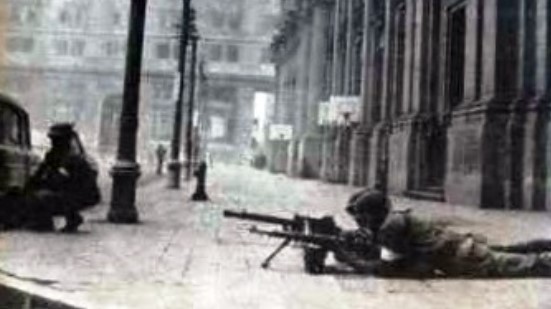
Optimistic as ever, Sam Russell of the Morning Star (10/7/73) reported: “Chile’s Popular Unity government has emerged strengthened and toughened after the defeat of the latest and most dangerous attempt to overthrow it”. But Allende’s “Marxist” apologist, Regis Debray, has described how “strong” and “tough” Allende really thought his government was: “He discovered that he could count on only four Generals out of 22…For several months, this (state) apparatus had been out of control and was sliding gradually into open insubordination …Allende was no longer making any plans further than 48 hours ahead” (Observer, 16/9/73).
Refusal to mobilise the working class
What was Allende’s response to this alarming situation? Debray describes how “Salvador, in high spirits…sat us round a camembert and told us about his interview the night before with a plotting General, the Air Force Commander, whom he had appointed the Minister of Transport, in order to neutralise him.” Evidently, Allende had little faith in the effectiveness of this tactic, as most of his conversation revolved around how he would protect his dignity when the Generals took over…”I shan’t let myself be bundled onto an aircraft in my pyjamas,” he said, “and I shan’t ask for asylum in some Embassy.”
However honourable the exit of Allende, it hardly makes much difference to the working class. And his refusal to mobilise them meant that all their courage was dissipated. They were left to organise sporadic resistance on their own initiative , shooting out from the factories, sitting targets for raids from the air, cut off from any prospect of appealing to the troops to come over to the side of the workers.
According to Debray, when Carlos Altamirano, General Secretary of the Socialist Party, urged Allende to organise a workers’ militia, arguing quite correctly that “the best way to bring about a confrontation and make it even bloodier is to turn your back on it” Allende only retorted: “And how many masses does it take to stop a tank?” Of course it is not a military but a political question. The same man who was publicly praising the loyalty of the officers to the elected government, privately had no faith in the possibility of winning over the rank-and-file soldiers!
It is a tragedy that, while the Generals were preparing their forces to seize power and violently crush the workers, Allende was telling high-spirited stories over camembert, worrying about whether he would be wearing pyjamas when the counter-revolution triumphed, and making fatalistic jokes about masses and tanks.
Crucial lessons of the coup.
Nobody can accuse us of “wisdom after the event”. As early as March 1971, we printed an article in Militant under the headline “CHILEAN CRISIS – ARM THE WORKERS AGAINST REACTION” . On October 1, 1971, we warned: “The sympathy of the soldiers will be of no avail unless the hold of the officer caste is shattered. That is impossible unless the army is faced with a powerful movement of the armed people. While Allende and the CP are busy lulling the masses with beautiful pictures of ‘peaceful parliamentary change’, the ruling class is systematically preparing for a counter-stroke.” In January 1972, we predicted in Militant International Review that “Allende’s slavish respect for authority – in the form of an army jackboot – will not slave his skin when conditions permit the counter-revolution to raise its head.” In August 1973, our headline read “CATASTROPHE THREATENS UNLESS WORKERS ARE ARMED.”
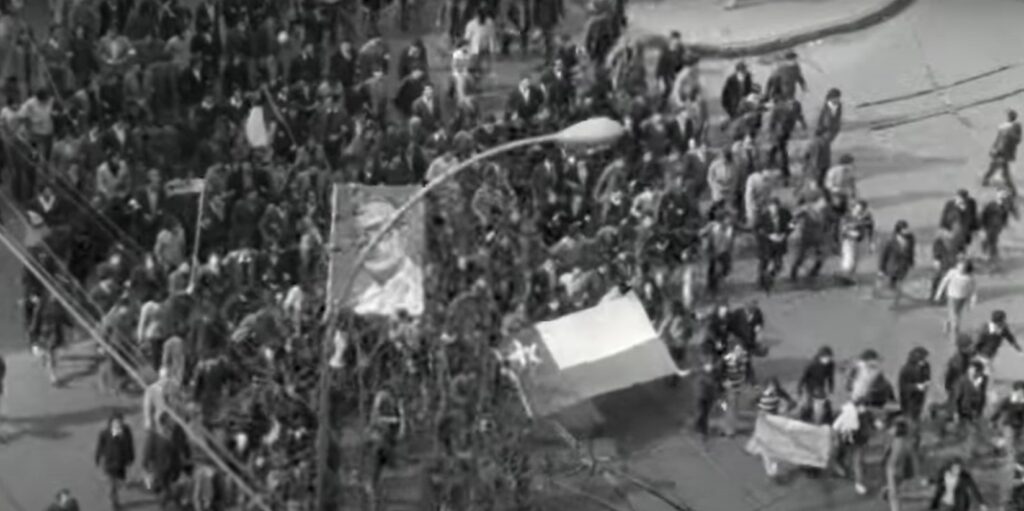
It is no cause for pleasure on our part that our warnings have proved correct. But why have those who held up Chile as a model for the last three years said not a word to correct their mistake? The arguments put forward by the Morning Star (17/9/73) give no reassurances that the deadly mistakes of the Chilean workers’ parties have been absorbed. And if the lessons are not well learned by the workers who face similar traps all over the world, then the Chilean workers will have died in vain. The best tribute to their memory is to learn from their experience.
The Morning Star claimed that in Chile “the Communists combined the aim of completing the anti-oligarchical and anti-imperialist revolution without civil war, with warnings about the danger of a coup and the need to resist it should it take place .” Buried in the welter of words praising the “loyalty” and “professionalism” of the armed forces, one can find here and there, odd references to a possible coup.
For instance, in the same speech where he repudiated the idea of a workers’ militia, Corvalan said: “Today, more than ever, we say no to civil war! But we stand ready to crush any sedition!” As we see, the Generals were not in the least deterred by these fine words. Since the workers proved quite unready to “crush sedition”, this was obviously just demagogic speechifying . How could they “stand ready” without a militia? Allende now and again talked, too, of “replying to reactionary violence with laws and justice, and if need be, with revolutionary violence”, and appealing “to the law, to the armed forces and, if necessary, to the people’s forces, to prevent Fascism from achieving its aims.” But it wasnecessary and the people had no forces with which to mount effective resistance. What kind of leaders talk about “the need to resist a coup should it take place” ? The Generals were not playing cricket, and they didn’t give formal notice of their intentions! It was too late to resist after they had taken power.
Morning Star failed to understand lessons of coup
The Morning Star continued: “The Chilean Popular Unity government came into office in conditions of extraordinary difficulty and complexity. Far from having the support of the majority of the people, Allende got only 36% of the votes in 1970. The objective was therefore to win more and more people to support the government…Whether more could have been done to win them, the extent to which they were antagonised by the adventurist actions and policies of the ultra-left, the tactics adopted toward the armed forces – these and other questions will need serious examination and discussion.”
Revolutions are periods when the mass of the population get up on their feet and invade the political arena in the struggle to shape their own destinies. In such a period, their consciousness can grow by leaps and bounds in a matter of days. Chile was undoubtedly entering a revolutionary period, and such periods are by definition “extraordinarily difficult and complex”. Revolutionaries must prepare themselves for decades to live up to situations such as these. If they explain their failure to meet the challenge by the “complexity” of the conditions, then they are only confessing that they have degenerated into petty pragmatists.
We have explained above the falsity of hoping to win the middle class by appealing to the Right. If the workers’ parties are to bear the odium for inflation and the other evils of capitalism, the desperate middle strata write them off as “fine talkers” who are incapable of action. All the official condemnation of “illegal” factory and land occupations did nothing to ingratiate the government to the middle class. Apparently, it is not sufficient that the government should denounce the spontaneous actions of its supporters and invite Generals into the Cabinet – there must be 100% unanimity behind the government’s concessions! But it is impossible to cy halt to the class struggle, to hold the entire population in check, while the government majestically issues successive decrees to change society. The class struggle waits for no-one. Allende’s election was the signal for all the pent-up energies of the masses to break forth. How can their aspirations to use their power be frozen – especially in “conditions of extraordinary complexity”, ie a revolution?
The difference in 1917 was the presence of the Bolsheviks
Kerensky, in 1917, also hysterically denounced workers and peasants for “provoking” the Generals by their “adventurist and ultra-left actions”. It was the Bolsheviks refusal to desert them, despite all the pressures, that earned them the political authority to carry through the socialist revolution. Kerensky’s government could end only in Soviet power or Kornilov’s terror. So it was in Chile. We hold no brief for the MIR [the Revolutionary Marxist Left”], but it is ridiculous to blame the coup on them.
Our criticism of this ultra-left grouping is not that they encouraged the occupation of factories and estates, but that they refused to work within the workers’ main organisations and dabbled instead with the pre-Marxist methods of “Guevarism” and “Castroism”. As for what is called “tactics adopted toward the armed forces” – to dissuade them from taking power by force by inviting them to enter the government peacefully – Allende learned the same lesson as the Spanish “Popular Front”, which also invited a general called Franco into the government in 1936, and likewise saw its “moderation” rewarded with murder.
The Morning Star promises us “serious examination and discussion” of the Chilean coup. But the material produced by the Communist Party since the coup reveals that it has learned nothing from the Chilean events, and that it is still putting forward the same dangerous policies for Italy, France, Britain and elsewhere. A pamphlet entitled “CHILE – SOLIDARITY WITH POPULAR UNITY” repeats all the discredited arguments of the Chilean CP.
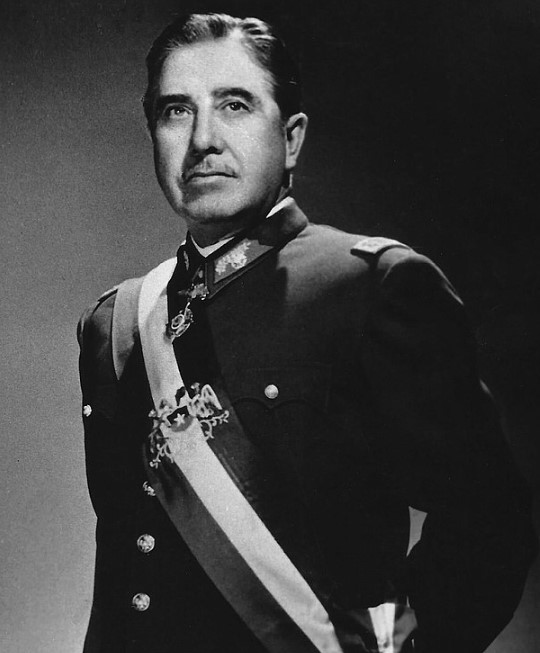
The aim of the “Popular Unity” government, it explains approvingly, was “for a national democratic revolution, paving the way for Socialism by carrying through basic democratic transformations in the economy and the State” : such reforms as “to put an end to the power of imperialists, the monopolists and the landowning oligarchy”. The conclusion which we have drawn from the Chilean coup and from similar utopian “experiments” in the past, is that it is impossible in the epoch of imperialism and monopoly capitalism to separate the “national democratic” from the socialist revolution. The pamphlet admits that “the real reason for the coup” was “the progress being made in weakening the economic and political power of the ruling class, in enabling more power and a bigger slice of the national cake to pass into the hands of the working class and its allies” – and then goes on to defend the CP “strategy” of carrying through “a transitional democratic phase” permitting a “change in the balance of class forces”! Its programme for Britain consists of “a left Labour government, and at a later stage a Socialist one”.
The Chilean Communist Senator Volodia Teitelboim wrote in the Morning Star (15/10/73) of the CP’s “conception of a pluralist revolution in the heart of the people, which brings together Marxist, Christian and rationalist forces”, condemned the “traitor Generals” who “betrayed their military oath” and defended the alleged “Leninist teaching on the necessity for the people – legitimate expression of democracy – to take control of the state”. Every line of his article reveals a completely anti-Leninist conception of the state, as can be seen from the quotations from Lenin given above.
It was the same Volodia Teitelboim who painted the situation in glowing colours in the Morning Star (10/3/72) : “The armed forces support the government as it is legally elected by the people…The classic Latin-American way of a military coup is more difficult in Chile…While the people of Chile have not yet got full power in their possession, they have the fundamental executive power based on the country’s constitutional and presidential regime…”
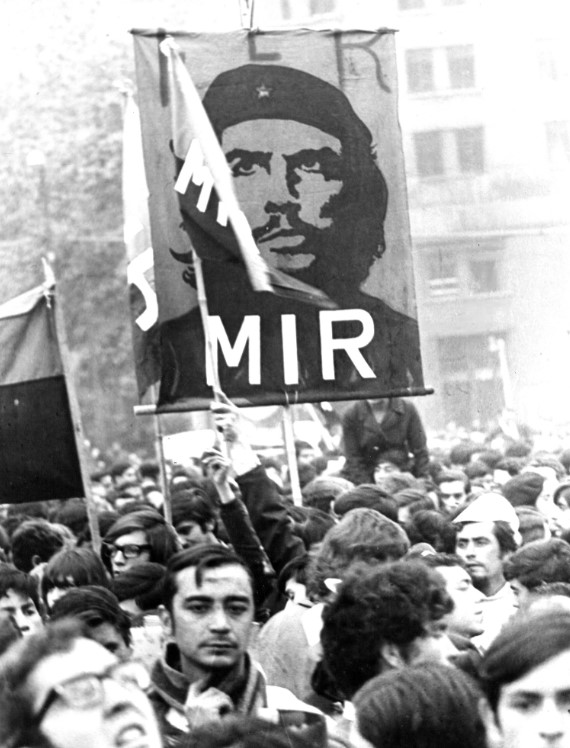
The Morning Star ended its article with the comment: “It would be a miracle if no mistakes had been made. But that does not mean that the general strategy was not correct. Those who criticise it have the obligation to say what their alternative would have been. If they argue that during the past three years, the Chilean revolutionary movement should have embarked on the path of armed struggle, then they have to show how this would have done anything other than play into the hands of reaction and resulted in the still earlier imposition of a right-wing dictatorship in Chile.”
The alternative was not exactly to “embark on the path of armed struggle”, but to prepare and organise in advance, and hence perhaps make unnecessary, the resistance of the workers who were mown down fighting reaction anyway. Was it not “playing into the hands of reaction” to leave them almost defenceless, and lull their vigilance with nursey rhymes about the Generals’ “loyalty”? Apparently, the Generals will always take power whatever you do. What a bleak choice the Morning Star offers the workers: defeat today or defeat tomorrow! How little faith it has in the working class!
It is revolting complacency to sit in an editorial office, writing “the general strategy was correct”, when thousands of workers lie murdered. A “general strategy” which leaves out of account the gathering counter-revolution is useless. Certainly, “it would be a miracle if no mistakes had been made” (although we still have not been told what they were). But what a catastrophe if the very same mistakes are then repeated elsewhere! The long history of class collaborationism is drenched in the blood of workers left politically and militarily disarmed against counter-revolution.
And throughout the world today, we see workers’ parties preparing just the same kind of “alliance” with “democratic”, “progressive”, or “liberal” parties who abhor the socialist revolution. In France, the “Popular Union” is tying the workers’ parties to the small Left-Radical party. In Germany the SPD is in a coalition with the FDP. In Italy, the CP is wooing “progressive” elements within the Christian Democracy for a coalition. In Spain, A “Liberty Pact” is proposed, linking “all democratic tendencies from Communists to conservatives and monarchists”. In Greece, the CP is linked to Papandreou’s “Patriotic Front”.
Let no-one trust the “democratic traditions” of the armed forces of Western Europe. The French ruling class is openly preparing the police and army for counter-revolution, as Mitterand has protested. The Italian Generals linked to the Fascist MSI have been caught hatching several putschist conspiracies already in the last ten years. Let us remember, too, that Chile was always called the “England of South America”. The reaction of the British ruling class to the Chilean coup must never be forgotten. The Economist (1/9/73) anticipated the coup by commenting: “The armed forces now hold the key to the future…The Marxist parties in Chile…have travelled a long way in less than three years towards destroying the economic base for the opposition parties and the independent press.” The Times (15/9/73) agreed that “there is a limit to the ruin a country can be expected to tolerate…The circumstances were such that a reasonable military man could in good faith have thought it his constitutional duty to intervene.”
The Tory Party and Fleet Street
The writing is on the wall: let a Labour government begin to “destroy the economic base” for the Tory party and Fleet Street, and there will be no shortage of Generals who will “in good faith” decide that “the country cannot tolerate any more ruin.” The Times has stated bluntly that the Labour Party, (unlike the Parliamentary Labour Party) id “dominated by Marxists” and has even talked with alarm of a possible “Chilean situation” in Britain, with a “Marxist Party” in government over a divided opposition. Top strategists like Brigadiers Kitson and Calvert have foreseen situations in which, with the collapse of the British economy, millions of people could have “justifiable grievances” and the Army might need to assist the police in quelling riots. Note that they do not bother to talk of “terrorists” and “fanatics”, but of the justified grievances of ordinary people!
The fact that Chilean servicemen are now being trained in Britain, and that British jet aircraft are being sold to Chile, is the best evidence of the British ruling class’s real attitude to “democracy” when the interests of capitalism are at stake.
The British Embassy in Santiago, according to The Observer, gave the new junta “undisguised approval” and – almost alone of all the foreign embassies – barred the door to refugees from the military terror.
The British Labour Movement, in preparing to contend with the upheavals of the next few years, will ignore the lessons of Chile at their peril.

